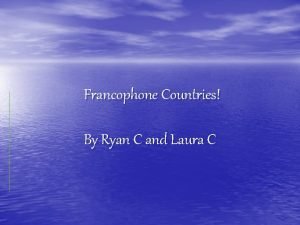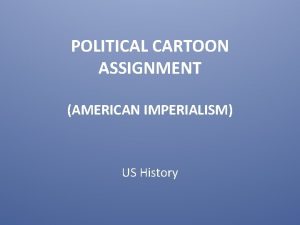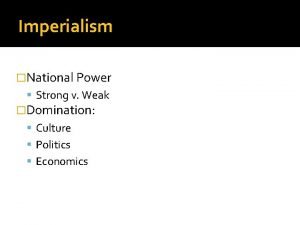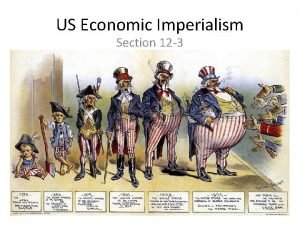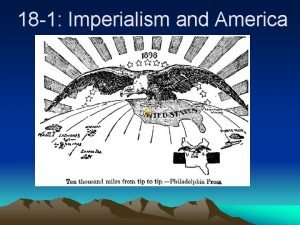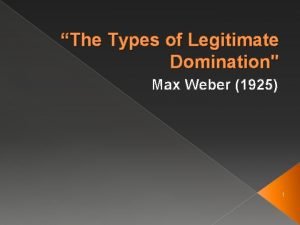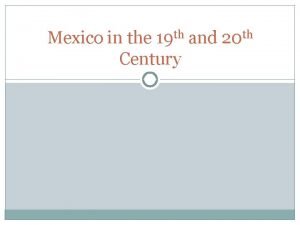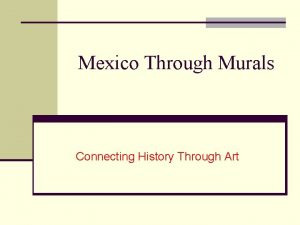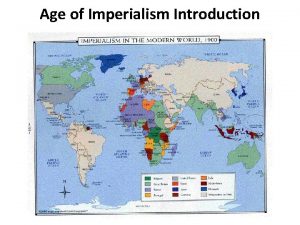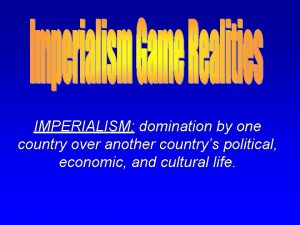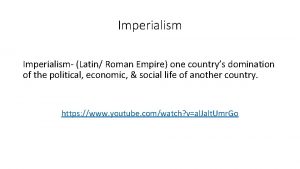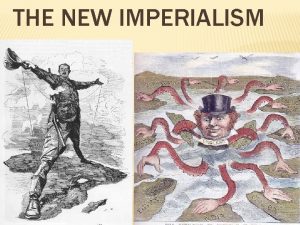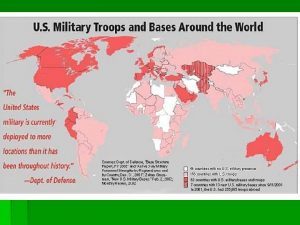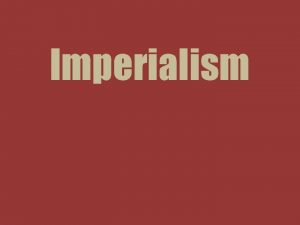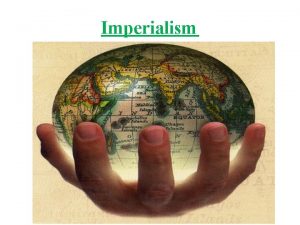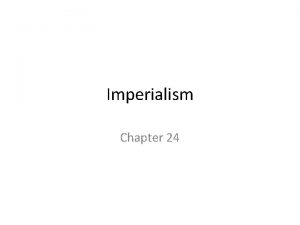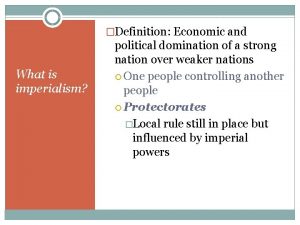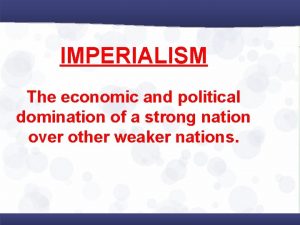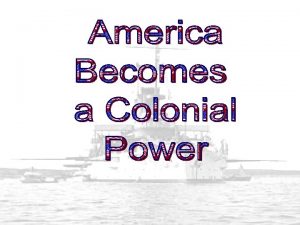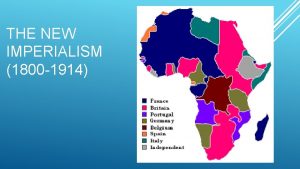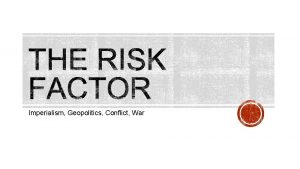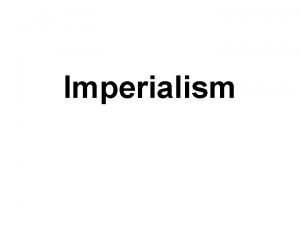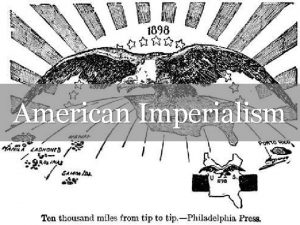Imperialism one countrys domination of the political economic




















- Slides: 20

Imperialism – one country’s domination of the political, economic, and social life of another country

Why Imperialism? “We must find new lands from which we can easily obtain raw materials and at the same time exploit the cheap slave labor that is available from the natives of the colonies. The colonies would also provide a dumping ground for the surplus goods produced in our factories. ” - Cecil Rhodes (1853 -1902), British imperialist

Imperialism CCOT Classical Era: Term “imperialism” dates back to Roman Empire (Age of Empires) 1450 -1750: European imperialism in Americas due to new maritime trade routes, but still based on agricultural economy 1750 -1900: New imperialism based on industrialization and manufacturing; Europeans venture inland in Asia and Africa (verses coastal trading ports in 1450 -1750)

Causes 1. Industrial revolution High demand for raw materials and expanded markets 2. Nationalism European nations competed for power Believed in superiority of their nation or race over others 3. Religious fervor– desire to spread Christianity 4. Feelings of racial and cultural superiority Impose European culture on other lands “White Man’s Burden”

Rudyard Kipling, “The White Man’s Burden”, 1899 Take up the White Man’s burden— Send forth the best ye breed— Go send your sons to exile To serve your captives' need To wait in heavy harness On fluttered folk and wild— Your new-caught, sullen peoples, Half devil and half child

Racial Ideologies New racial ideologies, especially Social Darwinism, facilitated and justified imperialism. 1. Social Darwinism Applied ideas from evolution to human society, especially “survival of the fittest” Belief that it is natural for the strong to dominate the weak 2. Scientific Racism Attempt to justify racist beliefs through the use of so-called “science” Ex: measuring heads, argument that white race represents highest evolution of human species


3 Types of Imperialism 1. Colonies Territory ruled directly by an imperialist power 2. Protectorates Had its own government, but officials of a foreign power guided its policies, particularly foreign affairs 3. Spheres of Influence Region of a country in which an imperialist power held exclusive investment or trading rights

Imperialism- Origins States with existing colonies strengthened their control over those colonies. British in India Dutch in Indonesia

Settler Colonies In some parts of their empires, Europeans established settler colonies. The British in southern Africa, Australia, and New Zealand The French in Algeria

British Settler Colonies

Decline of Spain and Portugal European states, Americans and Japanese established empires throughout Asia and the Pacific Spanish and Portuguese influence declined. Many of their colonies had won independence Spain and Portugal failed to industrialize and embrace global capitalism, relying on an outdated mercantilist model Ex: Spanish-American War (1898): USA victory- gains Philippines, Puerto Rico, Guam Cuba gains independence, but as protectorate of USA



Scramble for Africa Many European states used both warfare and diplomacy to establish empires in Africa. Berlin Conference 1884 -5 Organized by Bismarck; coincided with Germany’s rise as a colonial power Goal to regulate European colonization and trade in Africa, but resulted in “Scramble for Africa” Ex: Belgians in the Congo (King Leopold’s Ghost)

Imperialism in Africa partitioned (divided), with Europe controlling 90% by 1914.


Responses Conquered people resisted imperialism in a variety of ways, including rebellion and war Some elites embraced western education Some were used to help administer empire Over time, Western Enlightenment ideals of democracy and nationalism spurred independence movements

New States New states developed on the edges of existing empires. Ex: Zulu Kingdom Founded by Shaka Zulu in early 1800 s Expanded to include many tribes Clashed with Dutch Boers in South Africa Defeated by British in Anglo. Zulu Wars

American Empire?
 Countrys that speak french
Countrys that speak french Causes of new imperialism
Causes of new imperialism New imperialism vs old imperialism
New imperialism vs old imperialism Message behind
Message behind American imperialism political cartoons explained
American imperialism political cartoons explained What is the message of this political cartoon?
What is the message of this political cartoon? Economic imperialism in latin america
Economic imperialism in latin america What is imperialism? *
What is imperialism? * The roots of american imperialism 1. economic roots
The roots of american imperialism 1. economic roots Natural resources imperialism
Natural resources imperialism Types of domination
Types of domination La domination macrocéphalique de paris
La domination macrocéphalique de paris Domination techniques
Domination techniques Traditional legitimacy
Traditional legitimacy Different types of domination
Different types of domination Colonial domination diego rivera
Colonial domination diego rivera Colonial domination diego rivera
Colonial domination diego rivera Colonial domination diego rivera
Colonial domination diego rivera The types of legitimate domination
The types of legitimate domination 8 methods of tax attorney domination - indorecipe
8 methods of tax attorney domination - indorecipe Colonial domination diego rivera
Colonial domination diego rivera
